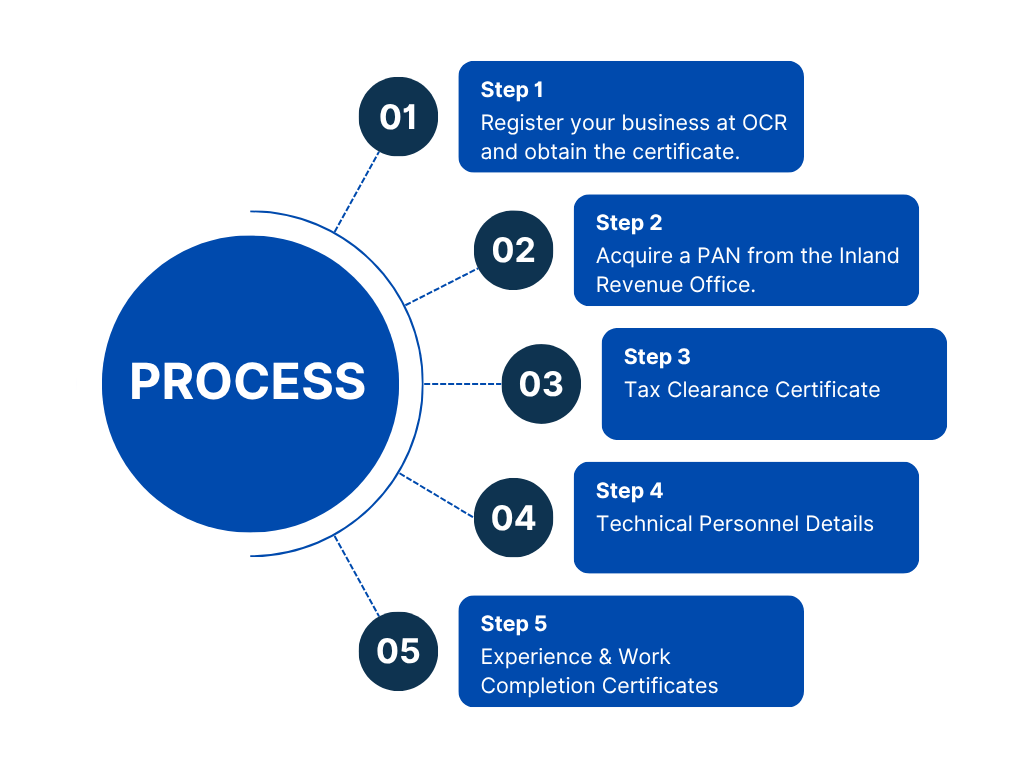This article covers the construction license in Nepal, construction company in Nepal, construction and engineering, licenses of construction, and government has revoked.
In Nepal, obtaining a construction license is a crucial step for individuals and companies looking to engage in construction activities. This comprehensive guide will walk you through the intricacies of the construction license process in Nepal, covering all classes and providing essential information for successful application and compliance.
What is Construction License in Nepal?
Nepal’s construction industry operates under a structured licensing system that categorizes contractors based on their capacity, experience, and financial strength. The construction license classes in Nepal are divided into A, B, C, and D categories, each with specific requirements and limitations.

- Class A: Highest category, allowing for large-scale national and international projects
- Class B: Permits medium to large-scale projects within Nepal
- Class C: Suitable for medium-scale construction works
- Class D: Entry-level license for small-scale construction activities
Understanding these classifications is crucial for contractors to determine which license best suits their capabilities and business objectives.
Steps for Obtaining a Construction License in Nepal
- Step 1: Determine the License Class
- Step 2: Gather Required Documents
- Step 3: Complete the Application Form
- Step 4: Pay the Required Fees
- Step 5: Submit the Application Package
- Step 6: Verification and Approval

Step 1: Determine the License Class
The first step in obtaining a construction license in Nepal is to determine the appropriate license class for your business. Nepal’s construction licensing system categorizes contractors into four classes: Class A, B, C, and D, based on the scale of the construction activities they wish to undertake. Class A is reserved for large-scale national and international projects, allowing contractors to engage in high-capacity works. Class B is suitable for medium to large-scale projects within Nepal, while Class C applies to medium-scale works that require less complex resources. Class D is for entry-level contractors engaged in small-scale construction.
Step 2: Gather Required Documents
Once you have determined the correct license class, the next step is to gather all the necessary documents for the application. The documents required for the construction license application vary depending on the license class, but generally include:
- Company registration certificate: Proof of your company’s legal existence.
- PAN/VAT registration: Verification of your business’s tax registration status.
- Tax clearance certificate: A document showing that your company has fulfilled tax obligations in the previous fiscal year.
- Engineering certificates of key personnel: These demonstrate the qualifications and experience of your technical staff, including civil engineers, overseers, and sub-overseers, depending on the class.
- Equipment ownership or lease documents: Proof that your business possesses the necessary construction machinery, whether owned or leased.
- Financial statements: To verify the financial stability of your business.
Gathering these documents meticulously is essential for the smooth processing of your application.
Education Consultancy Registration in Nepal
Step 3: Complete the Application Form
After collecting the necessary documents, the next step is to fill out the application form for the construction license. The form must be completed with accurate and up-to-date information about your company’s structure, financial capacity, technical qualifications, and past experience. This includes details about the proposed construction activities and your company’s ability to meet the demands of the desired license class.
Step 4: Pay the Required Fees
Once your application form is completed, the next step is to pay the required government fees. The fees for obtaining a construction license vary based on the license class. For example, Class A licenses are generally the most expensive, followed by Class B, C, and D. The payment is usually made at the designated government bank or payment center, and you will be provided with a receipt.
Step 5: Submit the Application Package
After completing the application form and paying the required fees, the next step is to submit the entire application package to the relevant municipal authority or construction licensing body. This includes your completed application form, supporting documents, and the fee payment receipt.
Step 6: Verification and Approval
Once your application is submitted, the authorities will initiate the verification process. This includes reviewing your documentation, confirming the accuracy of the information provided, and conducting any necessary site inspections. The licensing authority will assess your company’s financial stability, technical capacity, and the suitability of your equipment. Depending on the class of the license, they may also verify that your team of technical personnel meets the required qualifications. The verification process can take anywhere from a few weeks to a couple of months, depending on the completeness of your application and the class of the license.
How to Obtain Construction License in Nepal?

- Determine the appropriate license class for your business
- Gather all required documents and certificates
- Complete the application form with accurate information
- Pay the required government fees
- Submit the application package to the licensing authority
- Await document verification and potential site inspection
- Respond promptly to any requests for additional information
- Receive approval and collect your construction license
What are the Requirements for Construction License Process in Nepal?
The construction license application process in Nepal is governed by the Construction Business Act 2055 (1999) and its subsequent amendments relating to subrule of rule established by the local level.
Legal Requirements for Construction License
- Registration of the company or firm with the appropriate authorities
- Compliance with minimum capital requirements for the desired license class
- Fulfillment of human resource criteria, including qualified technical personnel
- Submission of necessary documents and certificates as prescribed by law
- Adherence to ethical standards and professional conduct in the construction industry
Applicants must ensure they meet all legal prerequisites before initiating the license application process
What documents are needed for Construction License in Nepal?
Applicants must prepare the following documents for obtaining the Construction License in Nepal:
- Company registration certificate
- PAN (Permanent Account Number) certificate
- VAT (Value Added Tax) registration certificate
- Tax clearance certificate for the previous fiscal year
- Citizenship certificates of company directors/partners
- Academic certificates of technical personnel
- Experience certificates of technical staff
- Equipment ownership or lease documents
- Bank guarantee or fixed deposit certificate as per license class
- Memorandum and Articles of Association (for companies)
Ensuring all documentation is complete and accurate is crucial for a smooth application process.
Qualifications for Construction License Process in Nepal
| License Class | Minimum Capital | Technical Staff | Equipment |
|---|---|---|---|
| Class A | NPR 30 million | At least one civil engineer with 5 years of experience | Ownership or lease of heavy construction machinery |
| Class B | NPR 15 million | At least one civil engineer with 3 years of experience | Ownership or lease of medium-scale construction equipment |
| Class C | NPR 5 million | At least one civil overseer with 3 years of experience | Basic construction tools and machinery |
| Class D | NPR 2 million | At least one civil sub-overseer | Essential construction tools |
Timeline for Construction License Application Processing Nepal
The processing time for construction license applications in Nepal can vary depending on the class and completeness of documentation. Generally, the timeline is as follows:
- Initial document submission and verification: 1-2 weeks
- Review by the licensing authority: 2-4 weeks
- Site inspection (if required): 1-2 weeks
- Final approval and license issuance: 1-2 weeks
Total processing time typically ranges from 5 to 10 weeks, assuming all requirements are met and no additional information is requested.
Cost Structure for Different Construction License Classes
The cost of obtaining a construction license in Nepal varies based on the class:
- Class A License: NPR 40,000 – 50,000
- Class B License: NPR 30,000 – 40,000
- Class C License: NPR 20,000 – 30,000
- Class D License: NPR 10,000 – 20,000
These costs include government fees, documentation expenses, and professional service charges. Additional costs may apply for document notarization and translation if required.
Government Fees for Construction License Registration Nepal
Official government fees for construction license registration in Nepal are set as follows:
- Class A License: NPR 20,000
- Class B License: NPR 15,000
- Class C License: NPR 10,000
- Class D License: NPR 5,000
These fees are payable to the Department of Urban Development and Building Construction or the relevant local authority handling the license application.
Checklist for registering a Construction Company in Nepal
- Determine appropriate construction license in Nepal
- Gather all required documents and certificates
- Verify capital requirements and arrange necessary funds
- Ensure technical staff qualifications meet license class criteria
- Prepare equipment ownership or lease documentation
- Complete application form with accurate information
- Pay required government fees
- Submit application package to the licensing authority
- Follow up on application status regularly
- Prepare for potential site inspection
- Collect license upon approval
Read More: Criteria for Five-Star Hotel in Nepal
Legal Framework Governing the Construction Licenses in Nepal
The construction licensing system in Nepal is regulated by several key legal instruments:
- Construction Business Act 2055 (1999)
- Construction Business Rules 2056 (2000)
- Public Procurement Act 2063 (2007)
- Local Government Operation Act 2074 (2017)
These laws establish the framework for licensing, define contractor obligations, and set standards for construction practices in Nepal.
Regulatory Bodies Overseeing Construction License Process
Several government entities are involved in the construction license process such as subrule of rule schedule relating to the License.
- Department of Urban Development and Building Construction
- Ministry of Urban Development
- Local municipal authorities
- District Administration Offices
- Nepal Engineering Council
These bodies collaborate to ensure proper regulation and oversight of the construction industry in Nepal.
Professional Services Required for License Application Nepal
While not mandatory, professional assistance can significantly ease the license application process. Services often sought include:
- Legal consultation for document preparation and compliance
- Accounting services for financial statement preparation
- Engineering consultancy for technical requirement fulfillment
- Translation services for non-Nepali documents
- Notary services for document authentication
Engaging professionals can help ensure accuracy and completeness in the application process.
What Happens after obtaining Construction License in Nepal?
The process after obtaining Construction License in Nepal are as follows:
- Renew the license annually before the expiry date
- Maintain accurate records of all construction projects
- Adhere to safety and quality standards in all operations
- Submit periodic reports to the licensing authority as required
- Participate in mandatory training and skill development programs
- Comply with tax obligations and financial reporting requirements
Ongoing compliance is crucial for maintaining the license and good standing in the industry.
Challenges in Construction License Process in Nepal
Applicants often face several challenges during the license application process based on rule schedule relating to subrule posed by the Local Municipality.
- Incomplete or inaccurate documentation
- Difficulty meeting minimum capital requirements
- Shortage of qualified technical personnel
- Delays in government processing and approvals
- Navigating complex regulatory requirements
- Language barriers for non-Nepali applicants
Anticipating these challenges can help applicants prepare adequately and seek appropriate assistance when needed.
Benefits of Obtaining Construction License in Nepal
Engaging professional services for your construction license application offers several advantages:
- Expertise in navigating complex regulatory requirements
- Reduced risk of errors and omissions in documentation
- Time-saving through efficient process management
- Up-to-date knowledge of legal and regulatory changes
- Assistance with post-license compliance and renewals
- Valuable insights into industry best practices and standards
Professional assistance can significantly streamline the application process and improve chances of success.
FAQs
What are the different classes of construction license in Nepal?
Nepal’s construction licensing system includes four classes: A, B, C, and D. Class A is the highest category for large-scale national and international projects, while Class D is the entry-level license for small-scale construction activities.
How long is a construction license valid in Nepal?
Construction licenses in Nepal are typically valid for one year from the date of issuance. Contractors must renew their licenses annually to maintain their operational status.
Can foreigners obtain construction licenses in Nepal?
Yes, foreigners can obtain construction licenses in Nepal. However, they must comply with additional requirements, including registering a company in Nepal and obtaining necessary work permits and visas.
What is the minimum capital requirement for licenses?
Minimum capital requirements vary by license class:
- Class A: NPR 30 million
- Class B: NPR 15 million
- Class C: NPR 5 million
- Class D: NPR 2 million
How to upgrade construction license class in Nepal?
To upgrade a construction license class, contractors must:
- Meet the higher class’s capital and technical staff requirements
- Submit an application for upgrade with supporting documents
- Pay the difference in license fees
- Undergo evaluation by the licensing authority
What experience is required for different license classes?
Experience requirements vary by class:
- Class A: Civil engineer with 5 years of experience
- Class B: Civil engineer with 3 years of experience
- Class C: Civil overseer with 3 years of experience
- Class D: Civil sub-overseer (no specific experience requirement)
Can companies hold multiple class licenses simultaneously?
Generally, companies are issued a single license class based on their highest qualification. However, they may be eligible to bid on projects of lower classes as well, depending on specific project requirements and regulations.
Our Law Firm, Axion Partners, can register Construction Company in Nepal with valid construction license as well with Speed, Quality & Expertise. You can WhatsApp or Contact us through the following details to obtain our Services.
How to Register a Construction Company in Nepal?
Step 1: Reservation of Name at OCR or Small Industries
Step 2: Registration of Company or Registration of Small Industry
Step 3: Tax Registration and Local Ward Office Registration
Step 4: Filing of Application at Respective Local Level (Municipality)
Step 5: Approval of License at Local Level Executive Meeting
How to get a Contractor License in Nepal?
Step 1: File an Application at the Respective Local Level
Step 2: Purchase of Necessary Equipment such as Label Machine, Water Pump and Tipper Contract
Step 3: Conducting Local Level Executive Meeting
Step 4: Approval of Contract License from the Executive Meeting
Step 5: Obtaining the Permit to conduct Construction Activities
What are the documents required for Construction License?
1. Company Registration Certificate
2. VAT Registration Certificate
3. 1 Lakh Deposit Voucher in the company bank account
4. Electricity Bill/Water Bill/Lalpurja of House Owner
5. Insurance Paper of All Machines & Bill Book of Tipper/Tractor
6. Work Agreement and Machine Inspection along with Work Agreement
What is the category of Engineering License in Nepal
A-Class License: Unlimited projects, advanced machinery, skilled workforce.
B-Class License: Medium-scale projects, moderate equipment, expertise.
C-Class License: Small-medium projects; minimal equipment required.
D-Class License: Low-budget projects; basic machinery needed.
Table of Contents
- 1 What is Construction License in Nepal?
- 2 Steps for Obtaining a Construction License in Nepal
- 3 How to Obtain Construction License in Nepal?
- 4 What documents are needed for Construction License in Nepal?
- 4.1 Checklist for registering a Construction Company in Nepal
- 4.2 Legal Framework Governing the Construction Licenses in Nepal
- 4.3 How to Register a Construction Company in Nepal?
- 4.4 How to get a Contractor License in Nepal?
- 4.5 What are the documents required for Construction License?
- 4.6 What is the category of Engineering License in Nepal





























